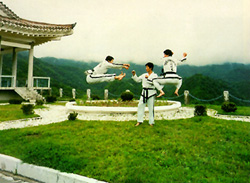In that five years I have had many life changes as my children have all become teens, one moved out, and I got a divorce. I have now been with a man for over a year who has operated several successful martial arts schools over a 40 year teaching career. What a gift he has been to me in operating such a business. A business that is blending business with an Asian Art form that has it's basis in integrity, honor, and ethics. So here is a list of what I have learned from teaching, running a brick and mortar business & learning from Jim, a World Champion 7th Degree Martial Artist (Tae Kwon Do). I have to give much credit to my teachers and friends also Robin Johnson and Elana Johnson, Stacey Faught, and the many female entrepreneur friends I have in my life.
1. Yoga & Martial Arts are not about a "goal" they are about a process. Becoming a "better" person is a process, a life long process.
2. History is important. It gives us a framework about where we come from. Learning about the history of yoga or martial arts gives your practice meaning and depth.
3. If you are in the business for the money or the fame.. you will always be searching. A few people become wealthy but I guarantee you that is not where their heart was when they set out on this journey.
4. When you start out becoming a teacher or getting certified to teach you need to have a heart for touching other peoples lives.
5. Running a yoga business or a martial arts business is still a business and should you move beyond teaching to opening a space your time will be dominated by administrative work, not teaching. You will end up teaching less & less very likely.
6. You will meet a diverse group of people and run into many view points, be open minded.
7. Always treat people with respect and honor, respect your seniors and instructors.
8. There is no substitute for experience, take your time and get experience. Don't be in such a hurry.
9. It is not necessarily good to try to teach in many places, it muddles the water when it comes to behaving with ethics. Business Ethics are not different from personal ethics. The Golden Rule applies everywhere. Again this is often why we shouldn't be so much about money. In Martial Arts it would never be acceptable to teach at one Dojo and then teach at another in the same town on regular basis. I am outspoken on this where others do not feel comfortable.
10. This business of being a free agent in yoga and everyone branding themselves is becoming very egotistical and is getting further & further away from yogic philosophy. I didn't become a studio school owner over night, I worked for many years and always respected my teachers and other teachers when doing so. That being said I made some mistakes and once realized them I faced them, made a mends and changed my way of doing things. Often we don't realize we may be behaving unethically until we are faced with a similar situation, then it's time to do the right thing.
The Connection with Martial Arts, Yoga and Business:
Tae Kwon Do exploded in the West in the 60's and 70's, Yoga has been growing by leaps and bounds in the U.S. since the 80's & 90's. Both were introduced to the West in the early 1900's and both have had their growing pains. We can learn a lot from Tea Kwon Do by comparing our similar philosophies that originated in the same part of the world
Tae Kwon Do: Tenants and Student Oath
Explanation of Tenets
1. Courtesy (Ye Ui)
Taekwon-Do students should attempt to be polite to one another and to respect others. Students should address instructors as Sir and to bow to the instructors before and after classes. Turning up early or on time for classes is also an aspect of courtesy.
2. Integrity (Yom Chi)
One who has integrity is able to define what is right or wrong and have the conscience, if wrong, to feel guilt. Taekwon-Do students should strive to be honest and to live by moral principles.
3. Perseverance (In Nae)
Perseverance means having patience. One of the most important secrets of becoming a leader in Taekwon-Do is to overcome every difficulty by perseverance. Confucius said," One who is impatient in trivial matters can seldom achieve success in matters of great importance."
4. Self-Control (Guk Gi)
Without self-control, a Taekwon-Do student is just like any fighter in the street. Loss of self-control is disastrous both in sparring and personal affairs. "The term of stronger is the person who wins over oneself rather than someone else", Lao Tzu.
5. Indomitable Spirit (Baekjul Boolgool)
A true student of Taekwon-Do will never give up, not even when faced with insurmountable odds. The most difficult goals can be achieved with indomitable spirit.

Student Oath
I shall observe the tenets of Taekwon-Do.I shall respect the instructor and seniors.
I shall never misuse Taekwon-Do.
I shall be a champion of freedom and justice.
I shall build a more peaceful world.
I shall never misuse Taekwon-Do.
I shall be a champion of freedom and justice.
I shall build a more peaceful world.
The Eight Limbs of Yoga
1. Laws of Yama - Abstentions
- Ahimsa: Non-violence
- Satya: Truthfulness
- Asteya: Non-stealing
- Brahmacharya: Sense Control
- Aparigraha: Non-greed
2. Laws of Niyama - Observances
- Saucha: Purity
- Santosa: Contentment
- Tapas: Austerity
- Svadhyaya: Self-study
- Ishwara pranidhana: Attunement to the Indwelling Reality
3. Asana - Posture
4. Pranayama - Breath Control
5. Pratyahara - Sense Withdrawal
6. Dharana - Concentration
7. Dhyana - Meditation
8. Samadhi - Enlightenment
According to the tradition, the eight limbs are interdependent and practiced simultaneously.
Om Shanti
.jpg)